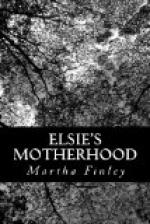[Footnote E: See Reports of Congressional Committee of Investigation.]
“No, sir,” returned Calhoun half-reluctantly, his face flushing hotly.
“No, emphatically no, say I!” cried Horace, Jr., “what could be more base, mean, or cowardly?”
“You don’t belong, do you, Cal?” asked Rosie, suddenly.
He dropped his knife and fork, his face fairly ablaze, “What—what could make you think that, Rosie? No, no, I—don’t belong to any organization that acknowledges that name.”
A suspicion for the first time flashed upon Mr. Dinsmore, a suspicion of the truth. Calhoun Conly was already a member of the White Brotherhood, the name by which the Klan was known among themselves, Ku Klux being the one given to the world at large; that thus they might avail themselves of the miserable, Jesuitical subterfuge Calhoun had just used.
He had been wheedled into joining it by Foster and Boyd, who utterly deceived him in regard to its objects. He had never taken part in the outrages and was now fully determined that he never would; resolving that while keeping its secrets, the penalty of the exposure of which was death, he would quietly withdraw and attend no more of its meetings. He understood the language of the searching look Mr. Dinsmore gave him and seized the first opportunity for a word in private, to vindicate himself.
“Uncle,” he said with frank sincerity, “I am not free to tell you everything, as I could wish, but I hope you will believe me when I assure you that I never had any share in the violent doings of the Ku Klux, and never will.”
Mr. Dinsmore bent upon him a second look of keen scrutiny. Conly bore it without flinching; and extending his hand, his uncle replied, “I think I understand the situation: but I will trust you, Cal, and not fear that in entertaining you here I am harboring a hypocrite and spy who may betray my family and myself into the hands of midnight assassins.”
“Thanks, uncle, you shall never have cause to repent of your confidence,” the lad answered with a flush of honest pride.
He returned to Roselands the next day, and went directly to an upper room, at some distance from those usually occupied by the family, from whence came the busy hum of a sewing machine.
The door was securely fastened on the inner side, but opened immediately in response to three quick, sharp taps of a pencil which Calhoun took from his pocket.
It was his mother’s face that looked cautiously out upon him. “Oh, you have returned,” she said in an undertone; “well, come in. I’m glad to see you.”
He stepped in, and she locked the door again, and sitting down, resumed the work, which it seemed had been laid aside to admit him. She was making odd looking rolls of cotton cloth; stuffing them with cotton wool.
Mrs. Johnson, the only other person present, was seated before the sewing machine, stitching a seam in a long garment of coarse, white linen.




